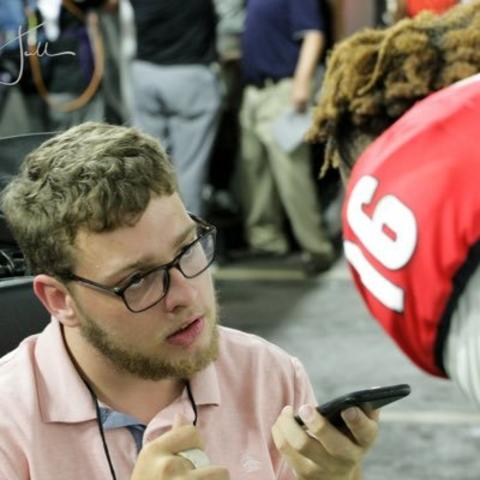
Section Branding
Header Content
First UGA Athlete To Announce Branding Deal In NIL Era Has Vision That's Long Term
Primary Content

Kendall Milton didn’t waste much time.
Georgia’s sophomore running back has probably had July 1 on his mind for quite some time, maybe ever since he came to the program as a beloved five-star prospect and advancements within college athletics took place. Milton came across the country to play in a Bulldog uniform with plans to build a career in business, after all, so these thoughts might’ve come naturally.
Once the clock hit midnight Thursday, it meant more than the start of another stifling summer month in the Peach State. It presented a new opportunity for college athletes to profit financially off of their name, image and likeness. The NCAA’s Division I Council approved temporary legislation allowing the measures to take place in the 11 states — including Georgia — which are activating the law in 2021.
“It’s just a different age, a different time,” Georgia Gov. Brian Kemp said May 6 as he signed legislation inside the Sanford Stadium facilities. “College football is so big. Players have a lot at risk. I think this is the right step at the right time in the right direction to continue to protect the student-athlete but also give the athletes a benefit of what others are getting across the sports world.”
Milton teased his plans with a branding deal a few hours prior to the NIL legislation officially being activated. He introduced the world to KM2, which started a dream for Milton that extends well beyond football, his father Chris Milton told The Telegraph.
Milton’s new brand has launched as a clothing line with a partnership with Seven Six Apparel Co., a company that designs apparel for sports markets around the Southeast — including Athens, Atlanta, Auburn, Knoxville and Nashville. The company created its own branding firm, Eikonic Brands, specifically designed to work with athletes who plan to take advantage of the NIL legislation.
Milton’s venture started with selling six T-shirts at a $25 clip on Day 1, but there will be more to come. Entrepreneurial endeavors have been a deep-seated passion for the running back, and his highest aspirations are to own a series of car dealerships once his playing days are over, his father said.
For now, Milton can take a strong freshman campaign where he drew many connections with the fan base to his benefit. He played in seven games and recorded 193 rushing yards, but showed glimpses of potential stardom while playing behind Zamir White, James Cook and Kenny McIntosh.
None of the other Georgia football players have announced a branding deal as of Thursday morning. Numerous athletes across all sports, however, have shared their excitement with the new legislation and might reveal further plans in the future.
“This is less about his football career but more about setting himself up to accomplish his long-term goal,” said Chris Milton, who indicated KM2 would expand into a so-called umbrella. “While he loves football, it is not the ultimate destination. The ultimate destination is creating generational wealth for his kids and the family that he starts. Football is the vehicle at this point, but the ultimate destination is a degree in business to run a profitable company.”
The name, image and likeness law in the state of Georgia allows athletes to benefit off of autograph signings, commercial appearances, social media posts, clothing lines, branding deals, personal appearances and other methods of receiving an income from their likeness. Many seasons ago, former Bulldog stars A.J. Green and Todd Gurley faced heavy suspensions after benefiting from memorabilia sales before the law was even a dream.
The law, formerly known as H.B. 617, features a caveat. It allows schools to take up to 75% of the athlete’s endorsement income and place it into an escrow account. The pool, upon their graduation, would be redistributed among all athletes.
Along with the state’s legislation, the NCAA’s approval for name, image and likeness to occur would occur on an interim basis while awaiting a law at the federal level. The new action continues a commitment to avoid pay-for-play, but allows for athletes to benefit in some way.
“One thing that we taught our children is that proper preparation helps create and prepare you for opportunities,” Chris Milton said. “I think that he just looks at this as an opportunity rather than a reward. As his career moves forward, he will add additional revenue streams.”
A new era of college athletics has arrived. Don’t expect many of them to wait around to make some profit, either.
“Let’s work,” UGA running back Zamir White posted to an Instagram story about the opportunities behind the NIL legislation.
This story comes to GPB through a reporting partnership with The Telegraph.

